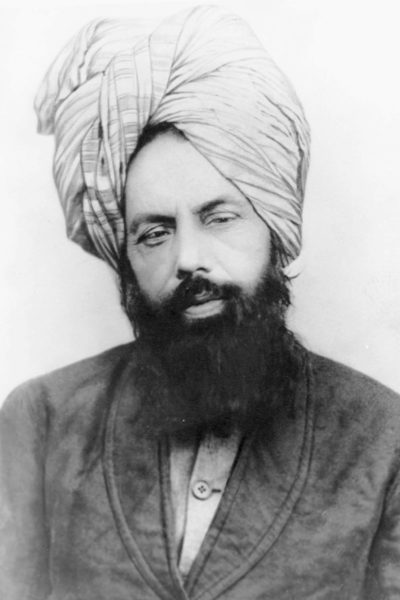

Mirza Ghulam Ahmad (peace be on him) was born in Qadian, India on February 13th, 1835 to Mirza Ghulam Murtaza and Chiragh Bibi. Born into a prominent family whose ancestry can be traced to Persia, he was the second of three children. He was homeschooled, his studies including logic, philosophy, medicine, and Urdu, Arabic, and Persian; he also independently studied religion. In 1851, he married his paternal cousin, Hurmat Bibi but the marriage ended in a permanent separation. From 1864-1868, he worked as a government clerk in the court in Sialkot.
While his father longed for him to pursue a secular career, Ahmad was drawn to Islam, spending most of his time in seclusion or engaging in religious debates. His father would quip that if one wished to look for his son, they might see if the person who stored the mosque’s prayer rugs did not mistakenly roll up Ahmad inside those rugs as Ahmad was always in the mosque.
From early in his youth, Ahmad was privy to spiritual experiences, including true dreams and visions and, later, revelation. He regularly fasted and spent his nights in deep contemplation and prayer. In March of 1882, he received a revelation informing him that God had anointed him as the mujaddid, or reformer, for the 14th century of Islam. In 1884, he married again, to Nusrat Jahan Begum, whose family traced its ancestry back to Prophet Muhammad (peace and blessings of Allah be on him). The couple enjoyed a blissful marriage and were blessed with five children that survived to adulthood.
As Ahmad’s devotion to Islam increased, so did his relationship with God. On March 23rd, 1889, under divine direction, Ahmad founded the Ahmadiyya Muslim Community in Ludhiana, India, taking an oath of allegiance from 40 devoted followers to strive to refine their character. He chose the name “Ahmadiyya” as “Ahmad” was the second name of Prophet Muhammad (peace and blessings of Allah be on him), the name also carrying a magnanimous connotation. To this day, members of the Community profess the same 10 Conditions of Initiation that those 40 followers professed more than a century ago. In 1891, under divine guidance, Ahmad claimed to be the Promised Messiah whose advent was foretold by the world’s major religions, to unite all of mankind.
As the Promised Messiah, Ahmad claimed that God sent him to end religious wars, condemn bloodshed, and restore morality, justice, and peace. He divested Muslims of fanatical beliefs and practices by vigorously championing Islam’s true teachings. He declared that a bloodless, intellectual “jihad of the pen” would replace a “jihad by the sword” – himself penning more than 80 books and tens of thousands of letters, delivering hundreds of lectures, and engaging in scores of public debates. He recognized the great religious founders and saints, including Zoroaster, Abraham, Moses, Jesus, Krishna, Buddha, Confucius, Lao Tzu, and Guru Nanak, and explained how their original teachings converge into Islam. Accordingly, despite facing bitter faith-based persecution in numerous Muslim majority nations, the Ahmadiyya Muslim Community continues to advocate for universal human rights for all religious and other persecuted minorities.
On May 26, 1908, Ahmad passed away at the age of 73 and was buried in Qadian. Under divine guidance, he claimed that, in accordance with the prophecy of Prophet Muhammad (peace and blessings of Allah be on him), a caliphate would care for the Community and continue to spread the Promised Messiah’s message.
Sign up to get updates
Keep up to date with our campaigns and learn how you can get involved.
Sign up to get updates
Keep up to date with our campaigns and learn how you can get involved.